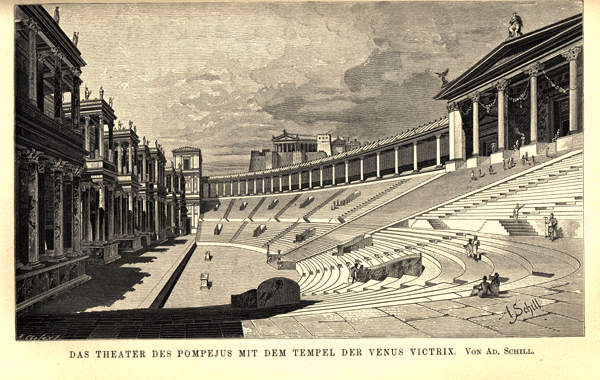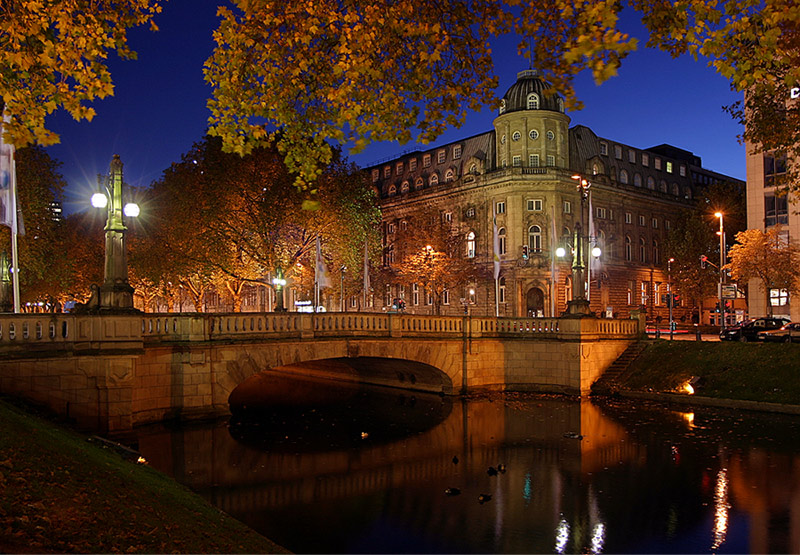|
Adolf Schill
Adolf Schill, often also ''Adolph Schill'' (14 May 1848 – 10 November 1911), was a German architect, interior designer, artisan, illustrator and painter of the historism. As a university lecturer he worked at the Kunstakademie Düsseldorf between 1880 and 1911, thus helping to shape the later phase of the Düsseldorf school of painting. Students of sculpture also studied with him. Life Born in Stuttgart, Schill attended the State Academy of Fine Arts Stuttgart from 1864 to 1870, where he was introduced by the eclectic Christian Friedrich von Leins was taught architecture and Adolf Gnauth in stylistics. From 1870 to 1874, he deepened his knowledge of architecture while building the Vienna Ringtheater under Emil von Förster. He then embarked on a two-year Grand Tour to Italy, which had a lasting impact on his sense of beauty. He later travelled to Italy again several times. Between 1876 and 1880, Schill – as successor to – edited the journal ''Gewerbehalle'', the "organ ... [...More Info...] [...Related Items...] OR: [Wikipedia] [Google] [Baidu] |
Adolf Schill, Düsseldorf 1904
Adolf (also spelt Adolph or Adolphe, Adolfo and when Latinised Adolphus) is a given name used in German-speaking countries, Scandinavia, the Netherlands and Flanders, France, Italy, Spain, Portugal, Latin America and to a lesser extent in various Central European and East European countries with non-Germanic languages, such as Lithuanian Adolfas and Latvian Ādolfs. Adolphus can also appear as a surname, as in John Adolphus, the English historian. The female forms Adolphine and Adolpha are far more rare than the male names. The name is a compound derived from the Old High German ''Athalwolf'' (or ''Hadulf''), a composition of ''athal'', or ''adal'', meaning "noble" (or '' had(u)''-, meaning "battle, combat"), and ''wolf''. The name is cognate to the Anglo-Saxon name '' Æthelwulf'' (also Eadulf or Eadwulf). The name can also be derived from the ancient Germanic elements "Wald" meaning "power", "brightness" and wolf (Waldwulf). Due to negative associations with Adolf Hitler ... [...More Info...] [...Related Items...] OR: [Wikipedia] [Google] [Baidu] |
Grand Tour
The Grand Tour was the principally 17th- to early 19th-century custom of a traditional trip through Europe, with Italy as a key destination, undertaken by upper-class young European men of sufficient means and rank (typically accompanied by a tutor or family member) when they had come of age (about 21 years old). The custom—which flourished from about 1660 until the advent of large-scale rail transport in the 1840s and was associated with a standard itinerary—served as an educational rite of passage. Though it was primarily associated with the British nobility and wealthy landed gentry, similar trips were made by wealthy young men of other Protestant Northern European nations, and, from the second half of the 18th century, by some South and North Americans. By the mid-18th century, the Grand Tour had become a regular feature of aristocratic education in Central Europe as well, although it was restricted to the higher nobility. The tradition declined in Europe as enthusiasm fo ... [...More Info...] [...Related Items...] OR: [Wikipedia] [Google] [Baidu] |
Christoph König (germanist)
Christoph is a male given name and surname. It is a German variant of Christopher. Notable people with the given name Christoph * Christoph Bach (1613–1661), German musician * Christoph Büchel (born 1966), Swiss artist * Christoph Dientzenhofer (1655–1722), German architect * Christoph Harting (born 1990), German athlete specialising in the discus throw * Christoph M. Herbst (born 1966), German actor * Christoph Kramer (born 1991), German football player and winner of the 2014 FIFA World Cup * Christoph M. Kimmich (born 1939), German-American historian and eighth President of Brooklyn College * Christoph Metzelder (born 1980), German football player * Christoph Riegler (born 1992), Austrian football player * Christoph Waltz (born 1956), German-Austrian actor and two times winner of the OSCARS Academy Award * Christoph M. Wieland (1733–1813), German poet and writer * Prince Christoph of Württemberg (1515–1568), German regent and duke of the Duchy of Württemberg * Pri ... [...More Info...] [...Related Items...] OR: [Wikipedia] [Google] [Baidu] |
Heinrich Kraeger
Heinrich may refer to: People * Heinrich (given name), a given name (including a list of people with the name) * Heinrich (surname), a surname (including a list of people with the name) *Hetty (given name), a given name (including a list of people with the name) Places * Heinrich (crater), a lunar crater * Heinrich-Hertz-Turm, a telecommunication tower and landmark of Hamburg, Germany Other uses * Heinrich event, a climatic event during the last ice age * Heinrich (card game), a north German card game * Heinrich (farmer), participant in the German TV show a ''Farmer Wants a Wife'' * Heinrich Greif Prize, an award of the former East German government * Heinrich Heine Prize, the name of two different awards * Heinrich Mann Prize, a literary award given by the Berlin Academy of Art * Heinrich Tessenow Medal, an architecture prize established in 1963 * Heinrich Wieland Prize, an annual award in the fields of chemistry, biochemistry and physiology * Heinrich, known as Haida in Ja ... [...More Info...] [...Related Items...] OR: [Wikipedia] [Google] [Baidu] |
Düsseldorf-Stadtmitte
Stadtmitte (meaning: ''city centre'') is an urban quarter in the central Borough 1 of Düsseldorf, Germany. Stadtmitte borders with Carlstadt, Pempelfort, Oberbilk and the old town of Düsseldorf: Düsseldorf-Altstadt. Stadtmitte has an area of , and 14,654 inhabitants (2020). In the Stadtmitte there are: * Düsseldorf Hauptbahnhof, the Main Station for Düsseldorf * the Schadowstraße - one of the highest turnover shopping streets in Europe * the greatest theatre of Düsseldorf (Schauspielhaus) * the stock exchange of Düsseldorf * WestLB, the central bank of North Rhine-Westphalia (Landeszentralbank) * Thyssen-Haus ( Dreischeibenhaus) * the Königsallee, short Kö, a prominent shopping street. File:Koenigsalle-3.JPG, department store on Königsallee File:Sevens Düsseldorf Königsallee.jpg, "Sevens" shopping arcade File:Schauspielhaus 004 aussen FotoSebastianHoppe.jpg, Schauspielhaus Image:Hauptbahnhof in Duesseldorf-Stadtmitte, von Westen.jpg, Düsseldorf Hbf ''(c ... [...More Info...] [...Related Items...] OR: [Wikipedia] [Google] [Baidu] |
Gründerzeit
(; "founders' period") was the economic phase in 19th-century Germany and Austria before the great stock market crash of 1873. In Central Europe, the age of industrialisation had been taking place since the 1840s. That period is not precisely dated, but in Austria, the March Revolution of 1848 is generally accepted as the beginning of economic changes, in contrast to political reforms. In Germany, as a consequence of the large influx of capital resulting from French war reparations from the Franco-Prussian War of 1870–1871 and the subsequent unification of Germany, an economic boom then gave rise to the description of these years as the "entrepreneurs' years". These years in Central Europe saw citizens increasingly influence cultural development. The time was also one of classical liberalism, even if the political demands of the time were only partially met. Industrialisation also posed aesthetic challenges, above all in the fields of architecture and craftsmanship, throug ... [...More Info...] [...Related Items...] OR: [Wikipedia] [Google] [Baidu] |
Walter Kyllmann
Walter may refer to: People * Walter (name), both a surname and a given name * Little Walter, American blues harmonica player Marion Walter Jacobs (1930–1968) * Gunther (wrestler), Austrian professional wrestler and trainer Walter Hahn (born 1987), who previously wrestled as "Walter" * Walter, standard author abbreviation for Thomas Walter (botanist) ( – 1789) Companies * American Chocolate, later called Walter, an American automobile manufactured from 1902 to 1906 * Walter Energy, a metallurgical coal producer for the global steel industry * Walter Aircraft Engines, Czech manufacturer of aero-engines Films and television * ''Walter'' (1982 film), a British television drama film * Walter Vetrivel, a 1993 Tamil crime drama film * ''Walter'' (2014 film), a British television crime drama * ''Walter'' (2015 film), an American comedy-drama film * ''Walter'' (2020 film), an Indian crime drama film * ''W*A*L*T*E*R'', a 1984 pilot for a spin-off of the TV series ''M*A*S*H'' * ''W ... [...More Info...] [...Related Items...] OR: [Wikipedia] [Google] [Baidu] |
Elberfeld
Elberfeld is a municipal subdivision of the German city of Wuppertal; it was an independent town until 1929. History The first official mentioning of the geographic area on the banks of today's Wupper River as "''elverfelde''" was in a document of 1161. Etymologically, ''elver'' is derived from the old Low German word for "river." (See etymology of the name of the German Elbe River; cf. North Germanic ''älv''.) Therefore, the original meaning of "elverfelde" can be understood as "field on the river." Elverfelde received its town charter in 1610. In 1726, Elias Eller and a pastor, Daniel Schleyermacher, founded a Philadelphian society. They later moved to Ronsdorf in the Duchy of Berg, becoming the Zionites, a fringe sect. In 1826 Friedrich Harkort, a famous German industrialist and politician, had a type of suspension railway built as a trial and ran it on the grounds of what is today the tax office at Elberfeld. In fact the railway, the Schwebebahn Wuppertal, was eventu ... [...More Info...] [...Related Items...] OR: [Wikipedia] [Google] [Baidu] |
Malkasten
Malkasten (English: "Paintbox") is a progressive German artists' association, founded in Düsseldorf in 1848, during the March Revolution. Since 1867, their headquarters have been in the Pempelfort district. History During the unrest in 1848, artists also began to take part in political discussions. In August of that year, the held an event called the "Fest der Deutschen Einheit" (Festival for German Unity). Many artists and sculptors associated with the Düsseldorfer Malerschule took part in its artistic design. On the night of the celebration, they decided to establish an artist's association which, a few days later, they named "Malkasten", at the suggestion of Karl Hübner. The name was meant to express the equality of every "color"; artistic and political. The 112 founding members included not only academic professors, such as Theodor Hildebrandt, Heinrich Mücke and Karl Ferdinand Sohn, but also Lorenz Clasen, the editor of the satirical journal ', as well as many memb ... [...More Info...] [...Related Items...] OR: [Wikipedia] [Google] [Baidu] |
Friedrich Schaarschmidt
Friedrich Schaarschmidt (4 February 1863 – 12 June 1902) was a German landscape painter and figure painter of the Düsseldorf school of painting, conservator and art writer. Life Born in Bonn, Schaarschmidt was born in Bonn as the son of Professor Carl Schaarschmidt (1822-1908), a philosophy historian and head of the Bonn University Library. From 1880 until 1889, he studied painting at the Kunstakademie Düsseldorf. There, Hugo Crola, Johann Peter Theodor Janssen and Wilhelm Sohn, temporarily also Eduard von Gebhardt and Carl Ernst Forberg, were his teachers. As a practising artist, Schaarschmidt turned to En plein air. He often decorated his landscape paintings with figures in antique robes. At the request of Peter Janssen, Schaarschmidt 1893Wolfgang Hütt: ''The Düsseldorf School of Painting 1819-1869''. Verlag E. A. Seemann, Leipzig 1995, was appointed curator of the art collection of the Düsseldorf Academy as successor of Theodor Levin. As such, he also held a teach ... [...More Info...] [...Related Items...] OR: [Wikipedia] [Google] [Baidu] |




_b_396.jpg)
